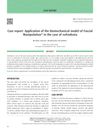 1 citations,
February 2017 in “Journal of gynecology and womens health”
1 citations,
February 2017 in “Journal of gynecology and womens health” The document concluded that more research is needed to understand how estrogen affects the enzyme involved in hirsutism development.
 1 citations,
April 2023 in “Frontiers in Immunology”
1 citations,
April 2023 in “Frontiers in Immunology” New treatments for hair loss from alopecia areata may include targeting immune cells, using stem cells, balancing gut bacteria, applying fatty acids, and using JAK inhibitors.
 April 2023 in “Clinical Chemistry and Laboratory Medicine”
April 2023 in “Clinical Chemistry and Laboratory Medicine” The document concludes that inflammation markers can be used in diabetes, vitamin D3 affects immune pathways, hyperthyroidism changes hormone levels, androgen levels help diagnose Adrenocortical Carcinoma, erectile dysfunction is linked to diabetes, hypogonadism is common in HIV-infected males, and hormones can be biomarkers for various conditions.
 9 citations,
March 2021 in “Hormones”
9 citations,
March 2021 in “Hormones” COVID-19 may affect male fertility and women might have better outcomes due to hormonal and immune differences.
 30 citations,
April 1997 in “European journal of endocrinology”
30 citations,
April 1997 in “European journal of endocrinology” The document concludes that managing hirsutism involves identifying the cause, using a scoring system for severity, combining cosmetic and medical treatments, encouraging weight loss, and providing psychological support, while noting the need for more research on drug treatments.
 28 citations,
November 2020 in “Journal of Controlled Release”
28 citations,
November 2020 in “Journal of Controlled Release” A new hair loss treatment uses tiny needles to deliver a drug-loaded lipid carrier, promoting hair growth more effectively than current treatments.
 23 citations,
December 2004 in “Differentiation”
23 citations,
December 2004 in “Differentiation” Sex hormones affect hair and feather growth and may help manage alopecia and hormone-dependent cancers.

Drinking sweetened tea and poor sleep habits may increase the risk of hair loss in women.

Drinking sweetened tea and poor sleep increase the risk of hair loss in women.

Drinking sweetened tea and poor sleep habits increase the risk of hair loss in women.

Drinking sweetened tea and late bedtimes increase the risk of hair loss in women.

Drinking sweetened tea and late bedtimes increase the risk of hair loss in women.
 February 2024 in “Buletin Veteriner Udayana”
February 2024 in “Buletin Veteriner Udayana” The dog with severe hair loss and itching improved after treatment for ehrlichiosis and demodicosis.

Finasteride reduces prostate size and PSA levels in young patients.
 April 2015 in “Andrology”
April 2015 in “Andrology” HNG may help prevent the negative effects of chemotherapy on sperm production and white blood cell counts.
 January 1989 in “Side effects of drugs annual”
January 1989 in “Side effects of drugs annual” Some cancer and immune system drugs can cause serious side effects, including heart, lung, nerve, and organ damage, which need careful monitoring and management.

Drinking sweetened tea and soda and poor sleep may increase the risk of hair loss in women.
 68 citations,
September 2003 in “British Journal of Dermatology”
68 citations,
September 2003 in “British Journal of Dermatology” Shrinking skin cancer increases the chance of cancer in nearby lymph nodes.
 5 citations,
February 2015 in “New England journal of medicine/The New England journal of medicine”
5 citations,
February 2015 in “New England journal of medicine/The New England journal of medicine” The conclusion of the case is not provided in the summary.
 50 citations,
November 2010 in “Otolaryngologic Clinics of North America”
50 citations,
November 2010 in “Otolaryngologic Clinics of North America” Recognizing oral symptoms can help diagnose and treat blood and nutritional diseases early.
 1 citations,
July 2020 in “Dermatology”
1 citations,
July 2020 in “Dermatology” Photobiomodulation helps reduce pain, lessen inflammation, heal wounds, and can be used in skin treatments. It also boosts hair growth in women with hair loss and may help fight microbes and prevent respiratory issues in COVID-19.
 105 citations,
February 2017 in “British Journal of Dermatology”
105 citations,
February 2017 in “British Journal of Dermatology” Survivors of Stevens-Johnson syndrome/toxic epidermal necrolysis need ongoing care for various long-term health problems.
 100 citations,
July 2004 in “The Journal of Sexual Medicine”
100 citations,
July 2004 in “The Journal of Sexual Medicine” Hormones like estrogen, testosterone, progesterone, and prolactin play complex roles in female sexual function, with testosterone potentially improving sexual desire, arousal, and satisfaction. However, more research is needed to establish safe and effective hormone treatments for female sexual dysfunction.
 3 citations,
March 2019 in “Post Reproductive Health”
3 citations,
March 2019 in “Post Reproductive Health” Testosterone replacement can help menopausal women with various symptoms, but should be used carefully and is not yet officially licensed in the UK for women.
 1 citations,
June 2023 in “International journal of basic science in medicine”
1 citations,
June 2023 in “International journal of basic science in medicine” Adiantum capillus-veneris may help with respiratory issues, but more research is needed.
 90 citations,
December 2007 in “Current Oncology”
90 citations,
December 2007 in “Current Oncology” Non-hormonal treatments should be used first for sexual dysfunction in postmenopausal breast cancer patients on aromatase inhibitors, with hormones as a second option.
 August 2021 in “Pelviperineology”
August 2021 in “Pelviperineology” Fascial Manipulation treatment helped a woman with vulvodynia and other health issues.
 November 2020 in “Journal of Bioengineering and Technology Apllied for Health”
November 2020 in “Journal of Bioengineering and Technology Apllied for Health” COVID-19 affects multiple body systems and complicates treatment; accurate testing is crucial.
 December 2023 in “Urogenital tract infection”
December 2023 in “Urogenital tract infection” Seminal bacteria can lower sperm quality in subfertile men.
 42 citations,
March 2014 in “European Journal of Pharmacology”
42 citations,
March 2014 in “European Journal of Pharmacology” Ginsenoside F2 from ginseng may increase hair growth better than standard treatments by affecting cell growth signals.






























